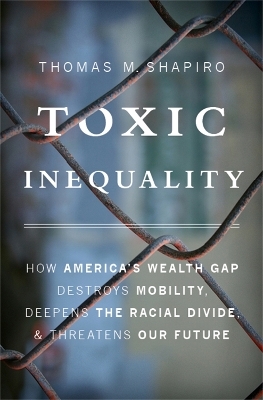
Toxic Inequality
How America's Wealth Gap Destroys Mobility, Deepens the Racial Divide, and Threatens Our Future
Seiten
2017
Basic Books (Verlag)
978-0-465-04693-5 (ISBN)
Basic Books (Verlag)
978-0-465-04693-5 (ISBN)
From a leading authority on race and public policy, a deeply researched account of how families rise and fall today
Since the Great Recession, most Americans' standard of living has stagnated or declined. Economic inequality is at historic highs. But inequality's impact differs by race; African Americans' net wealth is just a tenth that of white Americans, and over recent decades, white families have accumulated wealth at three times the rate of black families. In our increasingly diverse nation, sociologist Thomas M. Shapiro argues, wealth disparities must be understood in tandem with racial inequities-a dangerous combination he terms "toxic inequality."
In Toxic Inequality, Shapiro reveals how these forces combine to trap families in place. Following nearly two hundred families of different races and income levels over a period of twelve years, Shapiro's research vividly documents the recession's toll on parents and children, the ways families use assets to manage crises and create opportunities, and the real reasons some families build wealth while others struggle in poverty. The structure of our neighborhoods, workplaces, and tax code-much more than individual choices-push some forward and hold others back. A lack of assets, far more common in families of color, can often ruin parents' careful plans for themselves and their children.
Toxic inequality may seem inexorable, but it is not inevitable. America's growing wealth gap and its yawning racial divide have been forged by history and preserved by policy, and only bold, race-conscious reforms can move us toward a more just society.
Since the Great Recession, most Americans' standard of living has stagnated or declined. Economic inequality is at historic highs. But inequality's impact differs by race; African Americans' net wealth is just a tenth that of white Americans, and over recent decades, white families have accumulated wealth at three times the rate of black families. In our increasingly diverse nation, sociologist Thomas M. Shapiro argues, wealth disparities must be understood in tandem with racial inequities-a dangerous combination he terms "toxic inequality."
In Toxic Inequality, Shapiro reveals how these forces combine to trap families in place. Following nearly two hundred families of different races and income levels over a period of twelve years, Shapiro's research vividly documents the recession's toll on parents and children, the ways families use assets to manage crises and create opportunities, and the real reasons some families build wealth while others struggle in poverty. The structure of our neighborhoods, workplaces, and tax code-much more than individual choices-push some forward and hold others back. A lack of assets, far more common in families of color, can often ruin parents' careful plans for themselves and their children.
Toxic inequality may seem inexorable, but it is not inevitable. America's growing wealth gap and its yawning racial divide have been forged by history and preserved by policy, and only bold, race-conscious reforms can move us toward a more just society.
Thomas M. Shapiro is the Pokross Professor of Law and Social Policy at the Heller School, Brandeis University, where he directs the Institute on Assets and Social Policy. The author of four books, including The Hidden Cost of Being African American and, with Melvin Oliver, Black Wealth/White Wealth, he lives in Jamaica Plain, Massachusetts.
| Erscheinungsdatum | 20.03.2017 |
|---|---|
| Zusatzinfo | 2 tables |
| Sprache | englisch |
| Maße | 150 x 209 mm |
| Gewicht | 432 g |
| Themenwelt | Sozialwissenschaften ► Soziologie ► Allgemeine Soziologie |
| Sozialwissenschaften ► Soziologie ► Mikrosoziologie | |
| Wirtschaft ► Volkswirtschaftslehre ► Finanzwissenschaft | |
| Wirtschaft ► Volkswirtschaftslehre ► Makroökonomie | |
| ISBN-10 | 0-465-04693-2 / 0465046932 |
| ISBN-13 | 978-0-465-04693-5 / 9780465046935 |
| Zustand | Neuware |
| Informationen gemäß Produktsicherheitsverordnung (GPSR) | |
| Haben Sie eine Frage zum Produkt? |
Mehr entdecken
aus dem Bereich
aus dem Bereich
Übersetzt von Rudolf Eisler, mit einem aktuellen Geleitwort von …
Buch | Hardcover (2021)
Alfred Kröner Verlag
CHF 16,80
Positionen und Perspektiven
Buch | Softcover (2024)
Springer Fachmedien Wiesbaden GmbH (Verlag)
CHF 109,95


